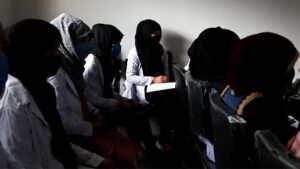
Aziza Rahimi laments the newborn boy she lost last year after a terrifying birth without medical assistance in a small hamlet surrounded by velvety white snow-topped mountains in Afghanistan’s Bamiyan province.
“I lost my infant, and it was too difficult for me. It is too agonizing, but as a mother, I nursed the child for nine months before losing him,” said Rahimi, 35.
For expectant mothers, the village’s remote location in the Foladi Valley of Bamiyan presents fatal obstacles. Sometimes snow blocks the village’s small, winding route, cutting off access to hospitals, clinics, and skilled medical personnel.
A change that could save lives is coming, though. One of many villages in the Bamiyan region that sent 40 young women to learn as midwives for two years in the provincial capital before returning home is Rahimi’s village.
Aziza Rahimi, 35, of Bamiyan, Afghanistan, who lost her son at delivery, speaks with a student midwife on March 2, 2023, in Foladi Valley.Reuters
Doctors and relief workers claim that isolation can turn into a death sentence in any difficult birth, which contributes to Afghanistan’s extremely high maternal and infant mortality rates, which are among the worst in the world.
The greatest maternal mortality rate in Asia, according to the United Nations, occurs in Afghanistan during pregnancy and childbirth every two hours.
The UNHCR, in collaboration with a nearby nonprofit organisation called the Watan Social and Technical Services Association, has been leading the trainee midwife project. They intend to broaden the program, which is also offered in the nearby region of Daikundi.
Taliban authorities have prohibited women from working in colleges and most charitable positions since taking power in 2021, but they have made exceptions in the healthcare industry, according to UNHCR, and local health authorities are said to be in favour of the project.
According to Mohammad Ashraf Niazi, the director of the UNHCR’s Bamiyan office, “When the roads are blocked, of course, there is no means of transportation. People even use donkeys to move patients to the clinic centers, but sometimes there isn’t even the opportunity for that.”
Rahimi, a mother of five other children, said that when she was suddenly overcome by agony four months ago while nine months pregnant, riding a donkey was out of the question. Her husband couldn’t locate a car or an ambulance to take them to the hospital, so she stumbled for two hours, bleeding, to her in-laws’ house, where she gave birth.
On March 2, 2023, aspiring nurses attend a training session in Bamiyan, Afghanistan.Reuters
Soon after, the infant passed away. The paramedics arrived too late.
In Bamiyan’s main city hospital, where trainee midwives work alongside staff and receive training from an instructor on how to assess and counsel expectant women, deliver babies, and provide post-partum care, women giving birth encounter a very different situation.
One of the 23-year-old trainees, who walks two hours to the hospital every day, said, “We want to learn and serve the people of our village.” For their protection, UNHCR requested that the trainees’ names not be disclosed.
Under the supervision of two qualified health workers, a trainee midwife guides a woman in a tiny hospital clinic while dozens of women wait outside with a book of images outlining what to anticipate as she gets ready to give birth.
Another student midwife measures the blood pressure of a pregnant patient with an infection while another trainee midwife admits any women at risk of complications to a maternity ward in a nearby building. She visits a lady who gave birth six hours earlier on a regular basis, her infant daughter curled up by her side.
Many of the student midwives, some of whom have young families of their own, have encountered logistical and financial difficulties because they frequently must travel great distances or live far from home in order to attend the course.
The mother of an 18-month-old boy who struggled to access care in her village, the 20-year-old trainee said, “At first, I didn’t want to study nursing or to be a midwife, but after I faced problems and pains during my pregnancy, I got a desire to study midwifery.” Many women and families in rural regions, according to her, lack the knowledge and assistance necessary to get ready for a safe delivery.
“We need to alter this kind of thinking… To help troubled women, I want to travel to isolated regions.




